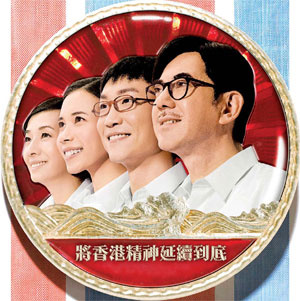| Home / HKSAR 10th Anniversary / Photos | Tools: Save | Print | E-mail | Most Read |
| Projecting the Past |
| Adjust font size: |
This film is not a salute to the 10th anniversary of Hong Kong's return to the motherland.
This is one point upon which Mr. Cinema (Lao Gang Zhengzhuan) director Samson Chiu, producer Henry Fong Ping and actor Anthony Wong Chau-Sang agree. Instead, the film was shot in 40 days to depict the past 40 years of Hong Kong's history. "Personally, I think this film would work as well if screened during the 11th or 12th anniversaries," Fong told China Daily. For Fong, the film is first and foremost a story about a common Hong Kong local - a character he believes most audiences could empathize with - and then about the city. "The Hong Kong story is not merely about poor people, but it's not about the wealthy either," Fong says. "No specific group can represent this city. We chose an ordinary man - a nobody - because I always think stories about common people are the most touching." Using a Forrest Gump-esque structure, the film tells the story of cinema projectionist Zuo Xianggang, whose lifelong dream is to take a photo in Tian'anmen Square. From 1967 to 2007, he and his family witness and experience the major events of the region. They live through the 1967 demonstration against British colonial rule, the rise and fall of the stock market, Hong Kong's handover to the motherland, the Asian financial crisis and the breakout of SARS. His dream, however, never falters. But he finds that his dedication to his motto - "all for one, one for all" - clashes with the realities of the world and even with his relationship with his son. The focus on a projectionist as the main character could remind many filmgoers of Cinema Paradiso. But in making Mr. Cinema, Chiu and Fong had much more in mind than creating "Hong Kong's Cinema Paradiso". Hong Kong is known as the oriental Hollywood. And the film's investor, Sil-Metropole Organization Ltd, is one of Hong Kong's most time-honored filmmaking companies, which runs a database containing about 500 old films. The scenes in the film that feature these old flicks, which are important parts of the city's history, are intended to awaken audiences' memories. But according to Chiu, the most important thing about the film is that it reflects the experiences that Hong Kong's people lived through. Over the past 40 years, Hong Kong has witnessed dozens of historic events, but the director wants them to be represented in the ways they were pertinent to common people's lives. When examining these events, most people care most about how they impacted ordinary people. In the film, Zuo lands a blow to the head when he joins the 1967 demonstrations against the British. His wife dies one year before Hong Kong's return to the motherland, which makes his joy during the reunification incomplete. And his son's aspirations to become rich overnight are dashed when the dotcom stock bubble burst in 2000. "Hong Kong people tend to focus more on reality," Chiu says. "You think these events have passed, but when you see the film, you rediscover a collective memory and realize all these things are not far away. They just happened over the past four decades, and we have experienced them together." One impressive scene takes place in the local cinema during the 1970s. Children frolic, a mother breastfeeds her baby, lovers feed snacks to each other and a boy spits chewed cane on the ground. It is the noisy and vivid Hong Kong Chiu remembers. On top of that, the hero's family lives in a bidonville on the roof of a building, where all they could see are surrounding buildings and electrical wires. Because of the high housing costs during the 1970s, inexpensive dwellings such as "roof houses" were then very popular among ordinary people but have since become rare. To construct a convincing roof house, Chiu rented the entire roof of a building where he built a vintage room. The window curtains, antenna, bed and mat they used in the film were all more than 40 years old. Fong says that many audience members shed tears at the film's Hong Kong premiere on June 13, which ran eight days before the mainland premiere. But will the Hong Kong story create such a stir among mainland audiences? "Most mainlanders see Hong Kong on their travels - more so recently, because that commute has become much easier to make in recent years," Chiu says. "But they don't know much about Hong Kong's past. Through this film, they will see a different but more realistic Hong Kong, which is fresh and attractive." And Fong attributes his confidence in the film's mainland success to the universality of the human feelings conveyed throughout the storyline. "When you see Forrest Gump from the perspective of a different culture, do you find it hard to understand? Human feelings are universal," the 30-year filmmaking veteran says. As he explains, Zuo's devotion to his faith, the tolerance of his loving wife, the generation gap between him and his son and their eventual development of mutual understanding after years of clashing, all appeal to universal human emotions. These elements would work just as well, he says, if they were instead part of a story about a Singaporean family, a Malaysian family or a family from the mainland. Chiu says he wouldn't feel frustrated if mainlanders don't like the film. "Someone has to try to figure out how to appeal to both audiences," he says. "Actually, I am very curious about mainland audiences' reactions, because this is what I can learn the most from." (China Daily June 23, 2007) |
| Tools: Save | Print | E-mail | Most Read |
 |
| Related Stories |
|
